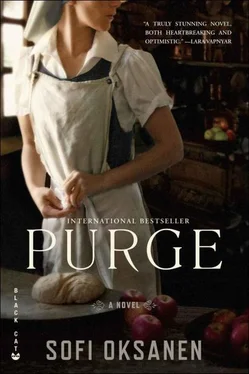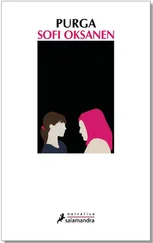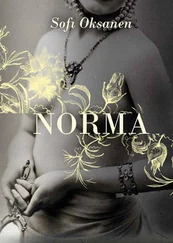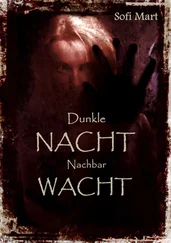“Yeah, like what?”
“Aren’t you excited about this at all?”
Aliide had an unpleasant feeling. It was as if Ingel were there, right in the room with her. She saw Hans’s gaze move to the wallpaper behind her. She forbade herself from turning to look.
“Ingel’s not in any trouble. You’ve read her letters, haven’t you?”
Hans stared past her.
“Maybe she can’t tell us everything in her letters.”
“For God’s sake, Hans!”
“Don’t get worked up, Liide, honey. That’s just our Ingel. She just wants to see us and talk to us.”
Hans had to get a passport as soon as possible. He had to come to his senses. But if he did get away from here, what would Aliide do? Why shouldn’t she leave, too, take the risk, and leave? It might get them both killed, but was there any alternative?
The crows were screaming like lunatics in the yard. Läänemaa, Estonia
Zara Finds Some Dead Flowers
Zara put her ear to the crack of the door, but the kitchen was silent. Even the radio was mute, no sound but the pounding pain in her head. She had given herself a headache in the last few minutes by whacking her head against the door, which was stupid of her. She wasn’t going to get Aliide to open the door. Pasha and Lavrenti would come back, that was clear. But would they come inside? They would make Aliide talk. Maybe she would tell them voluntarily. Maybe she would ask for money from Pasha and use it to have her field plowed. She had been complaining that now that there was no liquor ration she didn’t have anything to pay the few able-bodied men who were left. Zara couldn’t guess what Aliide was up to. There was an apple and a couple of acorns in the pocket of the housedress Aliide had loaned her. Zara was keeping them as souvenirs for her grandmother, seeds from Estonia. Would she ever get to give them to her?
Zara stood up. Although the air was stifling, there was a draft coming in from somewhere. There were a quilt and some baskets in the corner, and there was enough space that she could move a little. She was afraid to explore the place with her hands, so she started with her feet first, poked at the baskets-something clinked behind them. She pulled the object toward her with her foot. It was a plate. Next to the baskets there were some papers, magazines. A vase. There were dried flowers in it. Above the vase there was a little shelf. On the shelf was a candlestick with the stub of a candle in it. Above the shelf was a nail with a frame or a mirror hanging from it. Zara’s fingers brushed against the shelf, and her thumb came to a bracket that had papers shoved behind it, the corner of a notebook. What was this room used for? Why was it hidden behind a cupboard?
Läänemaa, Estonia
Aliide Is Almost Starting to Like the Girl
Aliide went and stood outside the room and stroked the cupboard with her fingers, then the wall next to it; then she started to move the cupboard, slowly, centimeter by centimeter. She could hear the click of her vertebrae, her joints cracking. She felt her whole skeleton, as if her sense of touch had moved into her bones and left her flesh numb.
She was a relative. This Russian girl. A girl who looked Russian. This family produced Russian girls. Not just little Pioneers like Talvi, not just little girls with short skirts and big bows on their heads, but real Russians, the kind of Russians who came here looking for a better life, messing things up, wanting, demanding. Russians like all the other Russians. Linda shouldn’t have had children. Aliide shouldn’t have, either. No one in their family should have had children. They should have just lived their lives to the end.
Aliide straightened her back, left the cupboard where it was, poured herself a glass of vodka, and tossed it down her throat, then wiped her mouth on her sleeve. Like a Russian. She still didn’t know what to do or how this worked. She smelled spruce, and the birch water Ingel used to wash herself, to wash her hair-the heavy smell of birch that had always come wafting suddenly into the air whenever Ingel loosened her braids. Another glass of vodka didn’t dispel the stench of birch. Aliide felt sick to her stomach. Her thoughts dimmed again, they started sloshing around in her skull like it was an empty space, then they gelled for a moment, then sloshed around again. She noticed she was thinking of the girl as “the girl”-her name was strangely missing; she didn’t know how to use it. The girl’s fear had been real. Her escape must have been real. The Mafia men were real. And they weren’t interested in Aliide, just the girl. Maybe the Mafia men’s story was true, maybe fate had tossed the girl into Tallinn, and she had killed a customer and run away and hadn’t known where else to go. It was a believable story. Maybe the girl didn’t want anything. Maybe she didn’t want anything or know anything except that she had to get away. Maybe that’s how it was. Aliide certainly understood what it was like to just want to get away. It was Martin who had wanted to be political. Aliide never had, although she marched by his side. Maybe the girl’s story was as simple as that. But Aliide had to get rid of her- she didn’t want the Mafia coming here again. What should she do? Maybe she shouldn’t do anything.
If nobody missed the girl, Aliide could seal up the air holes to the little room.
Something swelled up in Aliide’s brain. The curtains flapped like crazy, the clips that held them jingled, and the fabric snapped. The crackle of the fire had faded, and the tick of the clock remained, beneath the sound of the wind.
Everything was repeating itself. Even if the ruble had changed to the kroon and there were fewer warplanes flying over her head and the officers’ wives had lowered their voices, even if the loudspeakers on the tower at Pika Hermanni were playing independence songs every day, there would always be chrome-tanned boots, some new boots would arrive, the same or different, but a boot on your neck nevertheless. The foxholes had been closed up, the shell casings in the woods had tarnished, the secret dugouts had collapsed, the fallen had rotted away, but certain things repeated themselves.
Aliide felt like lying down, laying her heavy head on a pillow. The door to the little room was on her right; the girl inside had quieted. Aliide lifted the kettle of tomatoes and onions off the stove and put it on the floor-the jars should be filled up hot-but such a big chore felt impossible, the stones on her earrings were heavy, and the crows’ racket came all the way inside. She managed to put the horseradish in the jars, pour vinegar over it, and screw on the lids. She would have to do without the tomatoes, and the garlic still waiting to be ground. She washed her hands in the used water, wiped them on her hem, and went out to sit on the bench under the birch trees where she had planted gladiolas, the Russians’ flower. The noise of the crows continued farther off, in the silver willows.
The girl really was a better liar than Aliide ever had been. A master.
She had almost started to like her.
Hans’s granddaughter.
She had Hans’s nose.
What would Hans have wanted her to do? To take care of the girl, like he had wanted her to take care of Ingel?
Läänemaa, Estonian Soviet Socialist Republic
Why Can’t Hans Love Aliide?
Hans’s gaze turned inward. On the days when he could spend more time in the kitchen, when Martin was away for the night, he would be engrossed in counting the leaves or playing with Pelmi. Sometimes he would give Aliide a sly look, press his chin to his chest, and wrap his arms around himself as if he were trying to protect something inside him. Aliide rattled the jars, checked on her tinctures, tried to get Hans to drink what she felt were appropriate teas, simmered them all day, but Hans didn’t care for them, and Aliide tried not to be nervous, waved a dishcloth, poked at the fire in the stove, bustled and puttered, did laundry, and fed the chickens so much that when they’d emptied their dish they would doze the whole following day.
Читать дальше












